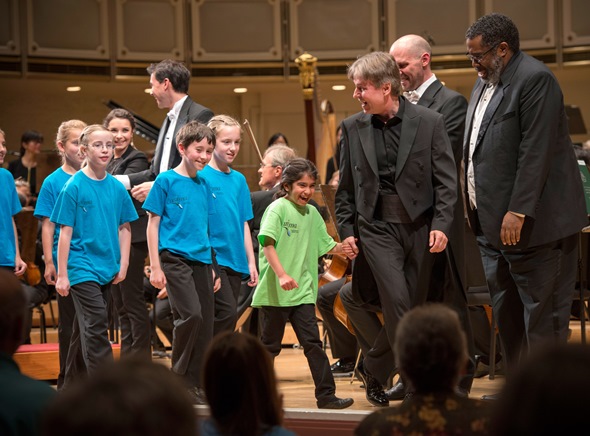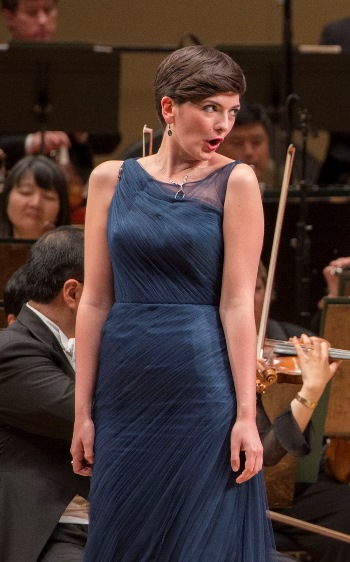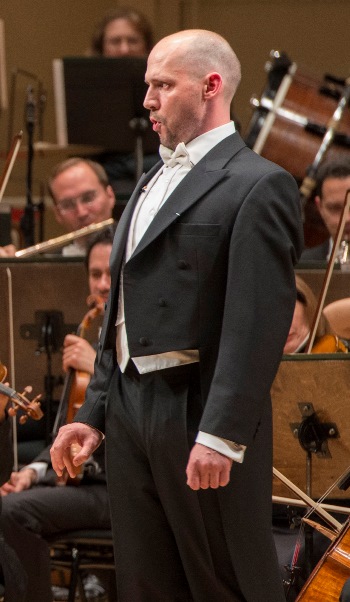Ravel opera rarity (an armchair sings) injects pure fantasy, great fun into CSO French fest
 Review: Chicago Symphony Orchestra, Chorus and vocal soloists conducted by Esa-Pekka Salonen, at Orchestra Hall through May 15.
Review: Chicago Symphony Orchestra, Chorus and vocal soloists conducted by Esa-Pekka Salonen, at Orchestra Hall through May 15.
By Lawrence B. Johnson
Perhaps it was the sheer lightness of spirit that made so beguiling a night of the Chicago Symphony Orchestra’s opening flourish in its festival dubbed “French Reveries and Passions.” It isn’t every CSO concert that ends with the conductor leading a gaggle of children across the stage like the pied piper.
But there he was, Esa-Pekka Salonen, smiling ear to ear, a little child’s hand in his, marching the Anima-Young Singers of Greater Chicago into view for their ovation after a deliciously witty performance of Ravel’s one-act opera “L’enfant et les sortilèges.”
 Ravel’s 45-minute romp, a sort of Paris music hall meets Disney affair populated with talking furniture and duetting cats, is one of those works more familiar by name than by experience. “L’enfant et les sortilèges,” which translates well enough as “The Child and the Enchantments,” is about a little rascal who, bored with his school work, drifts into a reverie in which all manner of creatures and objects confront him through words as well as actions – until he appeals for safe haven in that best of all possible ports: “Mama!”
Ravel’s 45-minute romp, a sort of Paris music hall meets Disney affair populated with talking furniture and duetting cats, is one of those works more familiar by name than by experience. “L’enfant et les sortilèges,” which translates well enough as “The Child and the Enchantments,” is about a little rascal who, bored with his school work, drifts into a reverie in which all manner of creatures and objects confront him through words as well as actions – until he appeals for safe haven in that best of all possible ports: “Mama!”
The composer’s collaboration with librettist Sidonie-Gabrielle Colette dragged on again-off again for 11 years before “L’enfant” finally saw the light of day in 1925. For whatever reason, the work has never gained a solid place on the opera stage, though surely not because of its unbridled whimsy: The audibly enchanted audience at Orchestra Hall rewarded the performance with boisterous approval.
 Considering its brevity, “L’enfant” is an ambitious opera involving eight soloists, chorus and children’s choir. Except for the soprano portraying the child – feistily sung here by soprano Chloé Briot – the other singers take multiple roles. And Salonen’s excellent cast lifted Ravel’s splendid bagatelle well above the category of a divertissement for children.
Considering its brevity, “L’enfant” is an ambitious opera involving eight soloists, chorus and children’s choir. Except for the soprano portraying the child – feistily sung here by soprano Chloé Briot – the other singers take multiple roles. And Salonen’s excellent cast lifted Ravel’s splendid bagatelle well above the category of a divertissement for children.
Among other things, sopranos Marie-Eve Munger and Kate Royal were, respectively Fire and a Bat; mezzo-soprano Marianne Crebassa was a Louis XV Chair and a marvelously meowing Cat in a feline dialogue opposite baritone Stéphane Degout‘s lusty Tom.
Contralto Elodie Méchain channeled a Dragonfly, tenor Manuel Nuñez Camelino a Black Wedgewood Teapot. (Does this sound like Disney’s “Beauty and the Beast,” or what?) Bass-baritone Eric Owens made a perfectly swell Armchair – and a Tree.
But what really sold the piece were the singers’ all-in characterizations. They absolutely went for the fantasy and the fun. What a pleasure to see concert singers with the music in their heads and no one’s head in a book. And, lest the viewer lose track of whether it was a squirrel or a tree singing, the projected translations were augmented by projected line drawings of the object of the moment.
 The Chicago Symphony Chorus filled in as shepherds and shepherdesses, frogs and so forth, and the children’s choir, decked out in an array of brightly colored T-shirts, sang in the unmistakable voices of bench, sofa, even numbers – imagined, if not imaginary.
The Chicago Symphony Chorus filled in as shepherds and shepherdesses, frogs and so forth, and the children’s choir, decked out in an array of brightly colored T-shirts, sang in the unmistakable voices of bench, sofa, even numbers – imagined, if not imaginary.
Underpinning all this, of course, was Ravel’s vibrant orchestral music turned with equal parts of sensitivity and élan by the CSO. As for Salonen, he dispatched his two assignments with characteristic flair (maestro) and manifest pleasure (parade leader).
The concert also began with Ravel in the world of children, with is his exquisite “Mother Goose” Suite. Just as “L’enfant” is little known, “Mother Goose” may be the most underestimated score Ravel ever penned. This five-movement suite with deceptively banal titles like “Tom Thumb” and “Conversations of Beauty and the Beast” is a thing of consummate refinement, and Salonen drew from the Chicago Symphony a performance of unerring delicacy, lyrical and radiant.
Dividing these offerings of Ravel was yet another work known these days by little more than its title: Debussy’s “La damoiselle élue,” inspired by Dante Gabriel Rossetti’s poem “The Blessed Damozel.” It is essentially a scena – for soprano, contralto and women’s chorus – in which a woman on the far side of death, in paradise, longs for her lover who remains on earth.
Debussy was 25 years old and enthralled by Wagner when he began work on “La damoiselle élue,” but if the music shows the influence of “Tristan,” it also foreshadows the young French composer’s mature style. Despite assured performances by Kate Royal, Elodie Méchain and the women of the Chicago Symphony Chorus, one came away with a sense of a composer who had not yet found his voice, and some understanding of why “La damoiselle élue” has not won a fixed place in the repertoire.
There’s yet another chance to catch this program — in an “extra” performance deferred to May 15.
The CSO’s French festival continues May 10 when French pianist Alexandre Tharaud presents a recital of music by Couperin, Rameau, Satie and Ravel at Orchestra Hall.
Salonen leads the Chicago Symphony in a concert version of Debussy’s opera “Pelléas et Mélisande” (May 14-19), then winds up his three-week stay with Messiaen’s “Turangalîla-symphonie” on a program with Ravel’s Piano Concerto in G featuring soloist Jean-Yves Thibaudet (May 21-23).
Two chamber music concerts complete the festival performance schedule: Cellist Yo-Yo Ma, pianists Orion Weiss and Matthew Aucoin and mezzo-soprano J’nai Bridges join members of the CSO in a program at Orchestra Hall that includes the world premiere of Aucoin’s Dual for Cello and Bass (Alexander Hanna joins Ma) as well as Messiaen’s “Quartet for the End of Time” and music of Ravel.
Finally, four CSO string players pair the Debussy and Fauré string quartets May 24 at the Art Institute of Chicago.
Related Links:
- Performance ticket info, dates and times: Details at CSO.org
- French pianist Cédric Tiberghien gives CSO’s festival a pitch-perfect start: Read the review at ChicagoOntheAisle.com
Tags: Chicago Symphony Orchestra, Chloé Briot, Elodie Méchain, Eric Owens, Esa-Pekka Salonen, Kate Royal, Manuel Nuñez Camelino, Marianne Crebassa, Marie-Eve Munger, Sidonie-Gabrielle Collette, Stephane Degout

